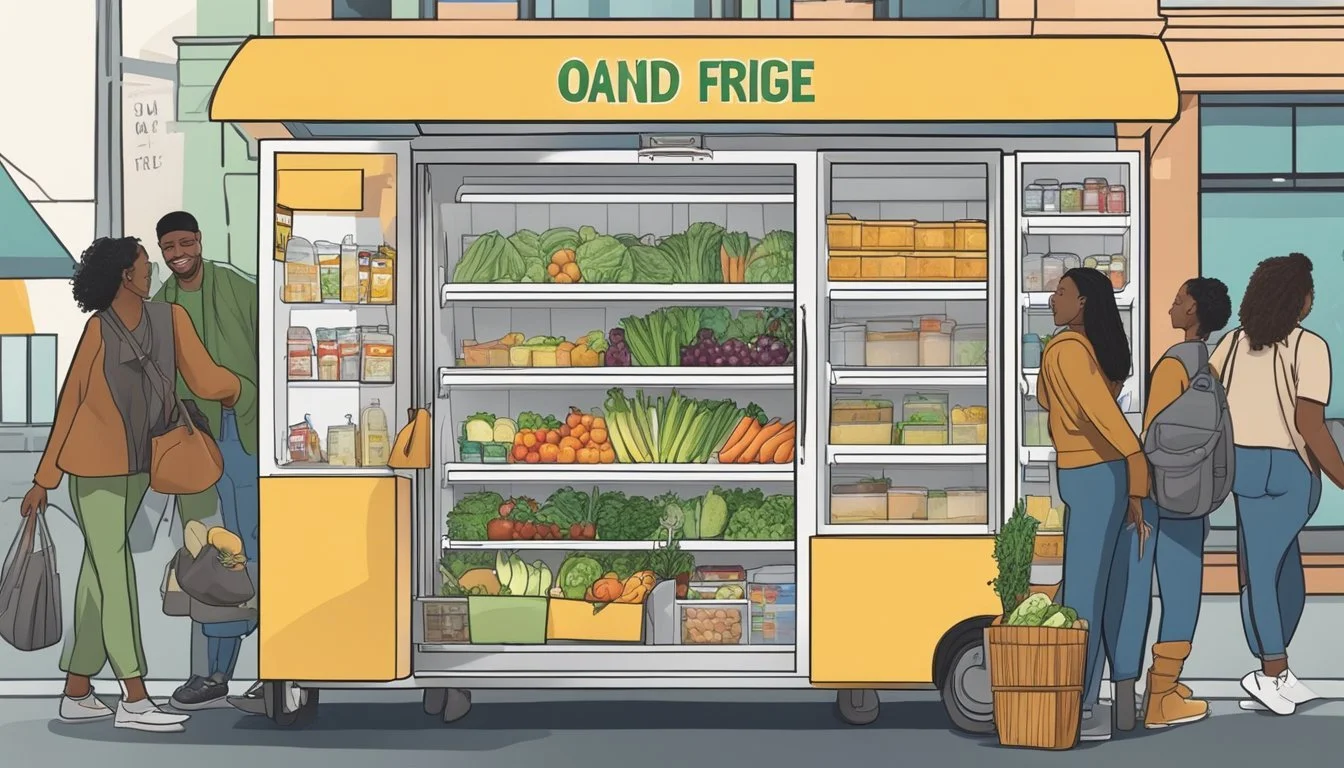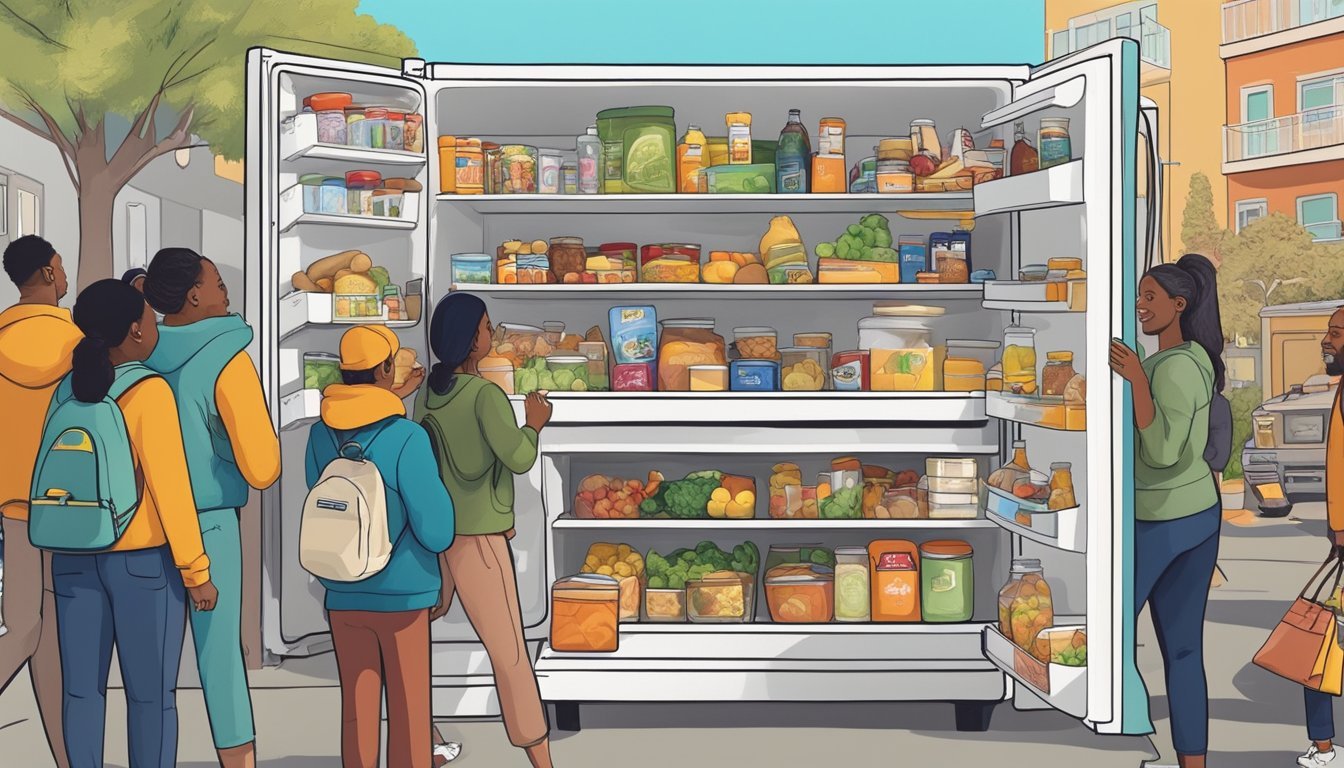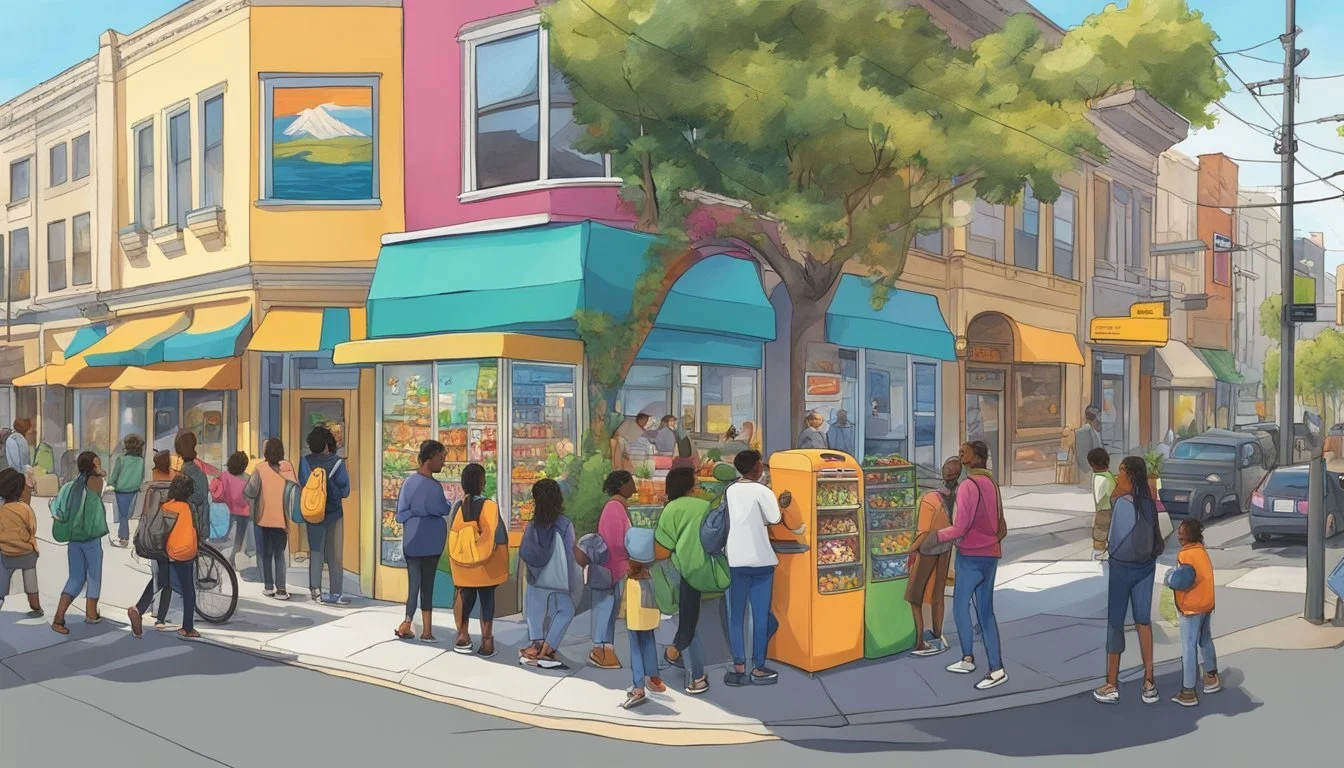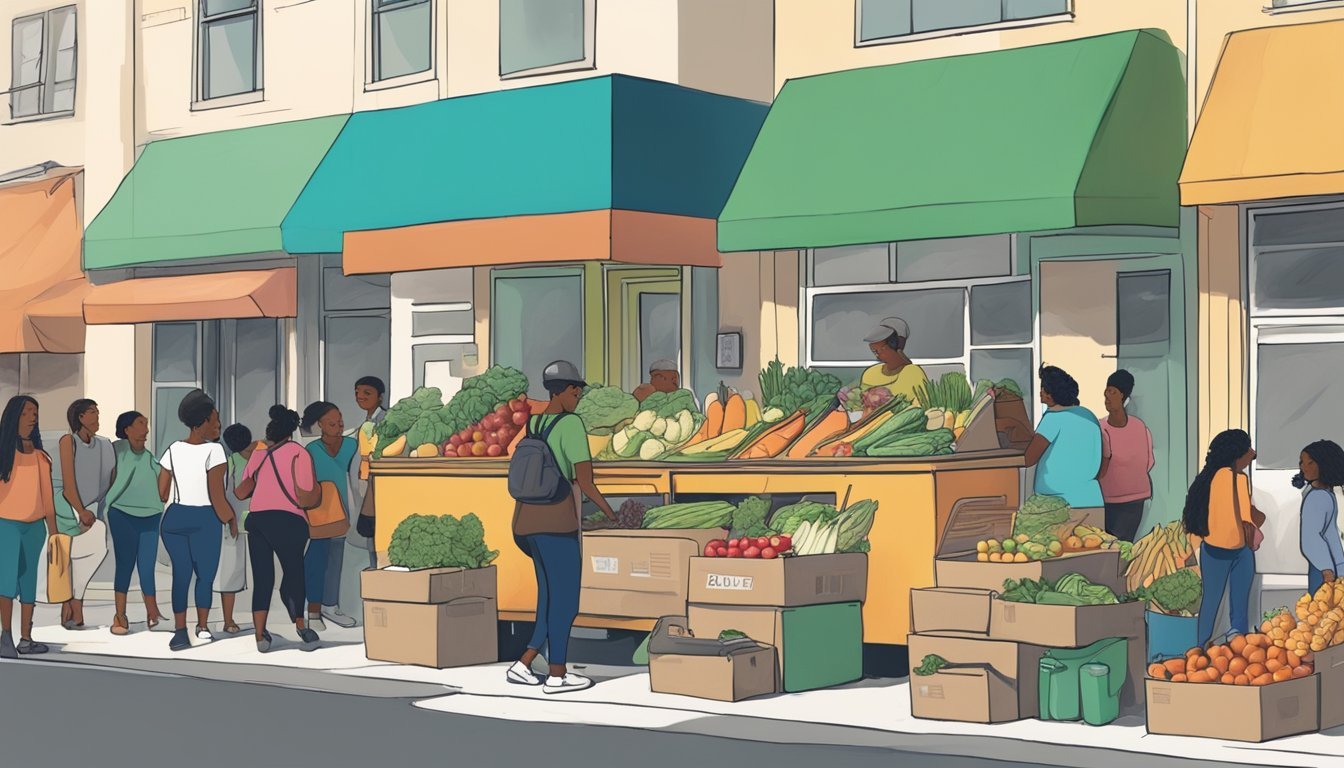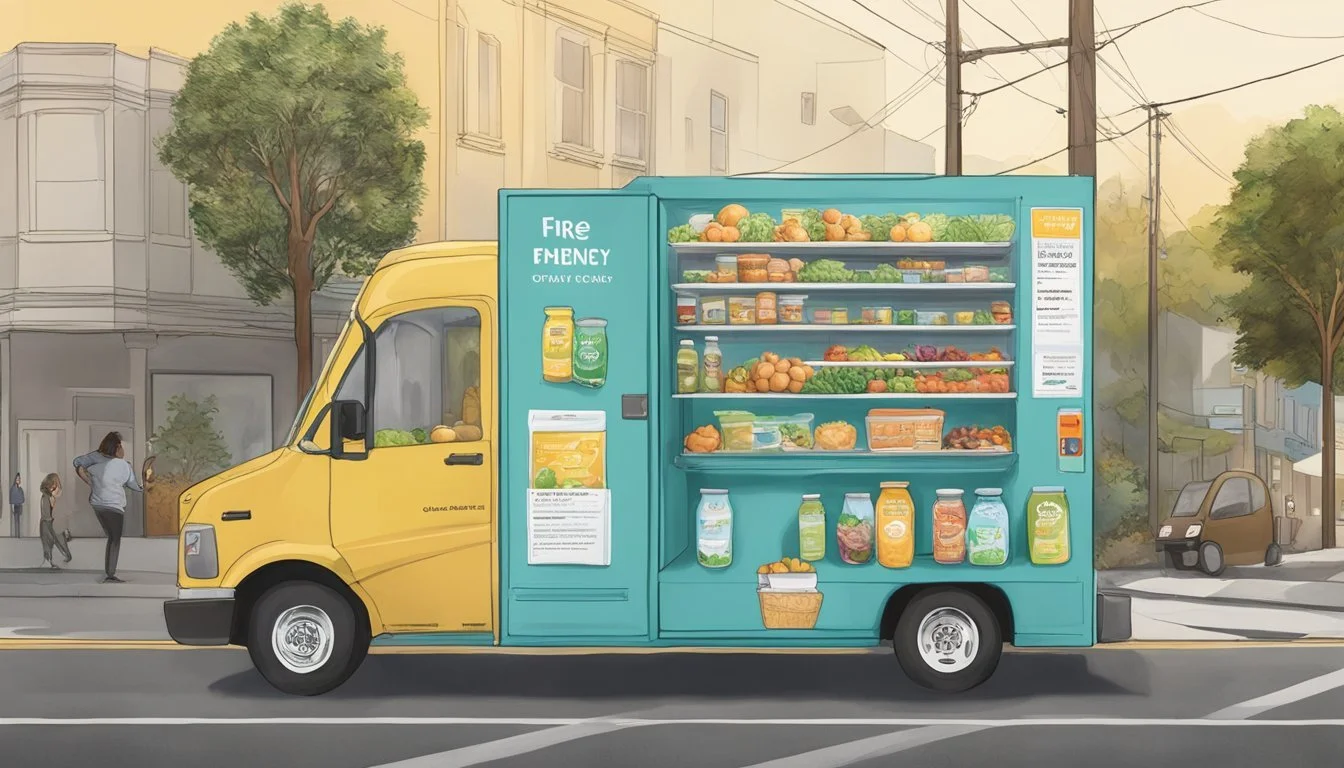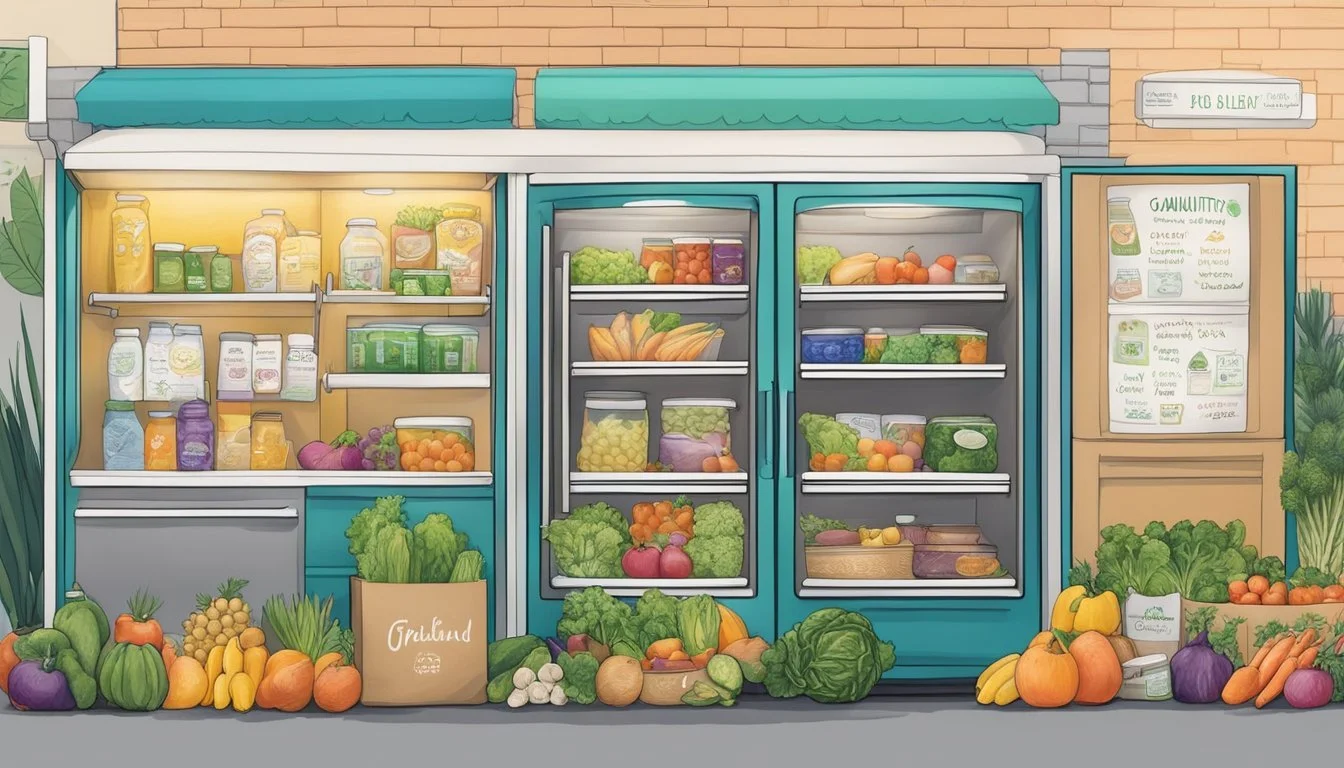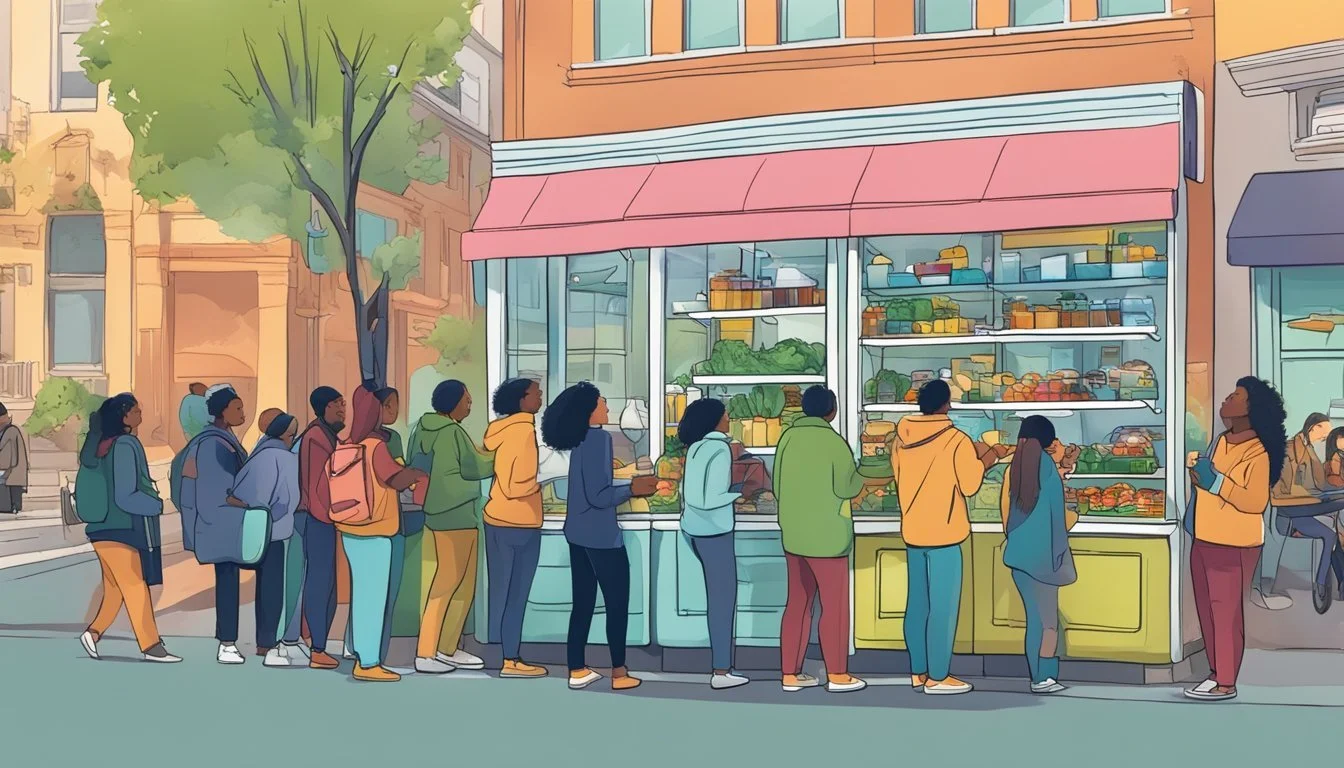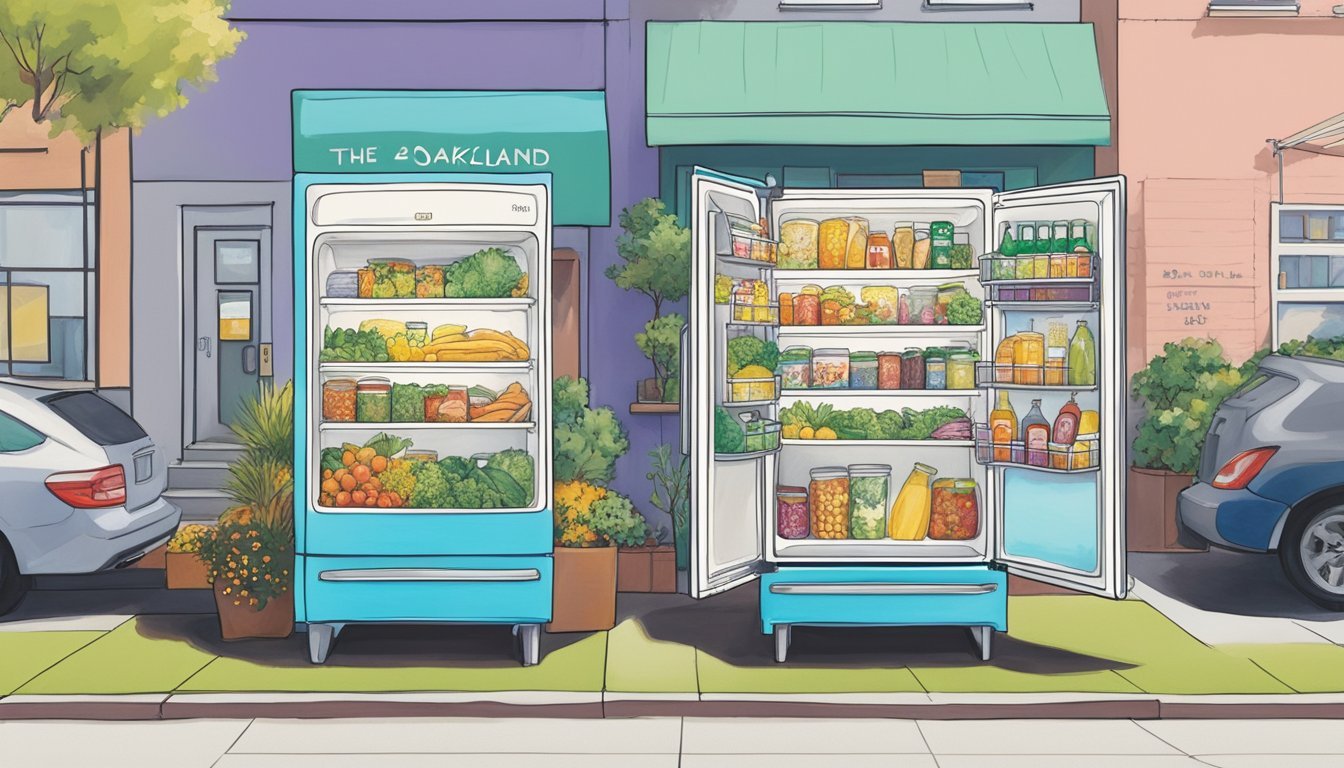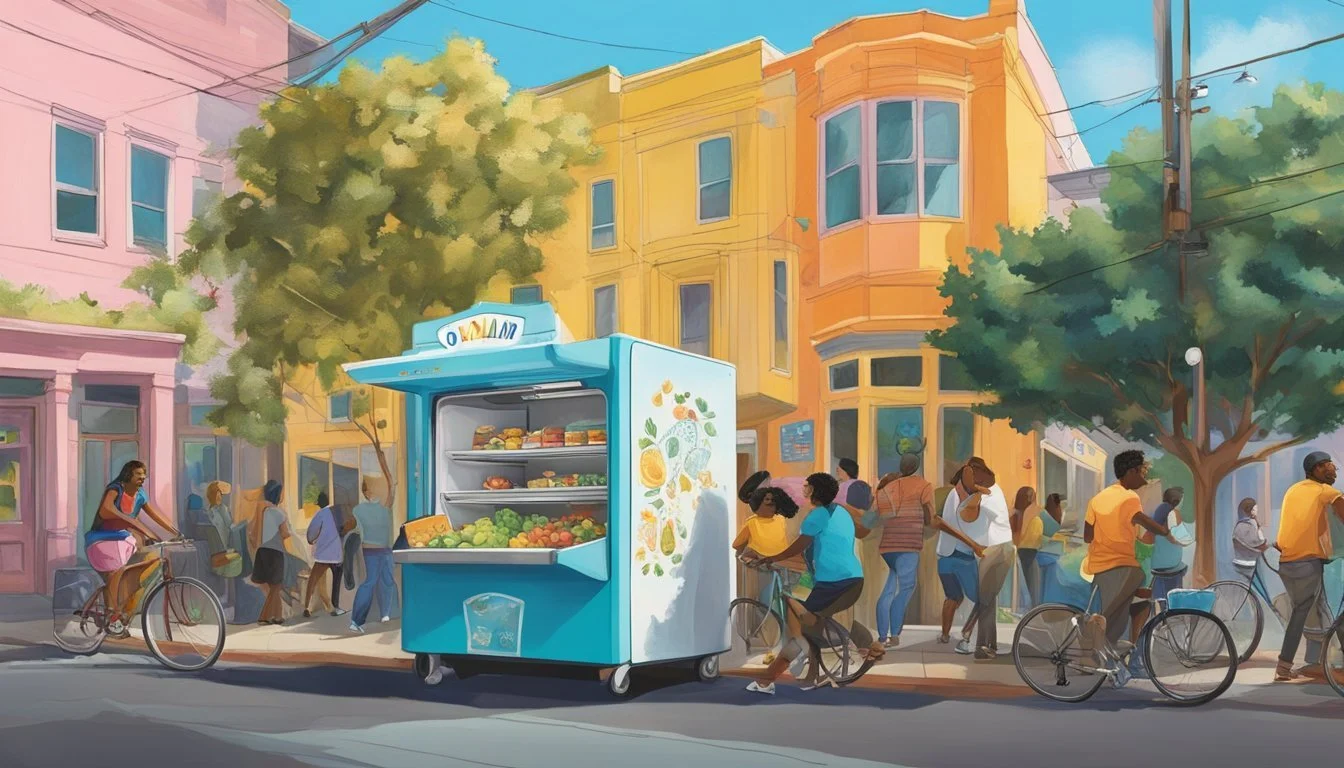Oakland, CA Community Fridge
Bridging the Meal Gap with Compassion
The Oakland, CA Community Fridge project is a testament to the city's solidarity and innovative approach to addressing food insecurity. In neighborhoods across Oakland, community fridges—public refrigerators stocked with free food—are popping up as a grassroots solution to help those in need. These refrigerators offer a range of perishable and non-perishable food items available to anyone without restriction, fostering a spirit of sharing and communal support.
Known colloquially as "Town Fridge," this movement thrives on the contributions of local residents, volunteers, and organizations committed to combating hunger in a direct and accessible manner. The fridges serve as decentralized food access points, mitigating the barriers faced by individuals and families experiencing food scarcity. The initiative not only provides sustenance but also strengthens community bonds by encouraging participation and a culture of mutual aid.
The placement of these fridges is strategic, situated in areas identified as food deserts or where residents suffer from economic disparities. The sustained operation of Oakland's community fridges relies on continuous community engagement, with volunteers restocking and maintaining the refrigerators to ensure a dependable source of free food. This model of community support has proven both effective and necessary, showcasing Oakland's proactive stance in nurturing inclusive spaces where individuals can find help and hope.
History and Origin
The Town Fridge initiative in Oakland, CA, is deeply rooted in the global mutual aid movement that has inspired similar projects worldwide. Its conception was closely linked to local community efforts that aimed at addressing food insecurity through the establishment of shared resources.
Global Mutual Aid Movement
The Global Mutual Aid Movement encapsulates a network of cooperative projects intended to offer communal support and resources, often in the form of shared food provisions. Town fridges represent a concrete manifestation of this movement. They are part of a broader trend that has taken shape in various locations, including New York, the UK, and Brazil, where communities install publicly accessible refrigerators to alleviate hunger and reduce food waste.
Local Beginnings
In Oakland, the Local Beginnings of town fridges emerged from a collective of seven organizers, who brought together their vast experience from nonprofit work, the food industry, and creative fields. They utilized secure messaging platforms to coordinate and strategize, laying the groundwork for what would become a network of community-supported free food refrigerators.
Initial Communication Platform: Signal
Organizer Backgrounds:
Nonprofit sector
Food industry
Creative scenes
By utilizing a grassroots approach, they addressed local food access issues, ultimately leading to the operation of multiple fridges throughout Oakland. These fridges are stocked by volunteers, including individuals like Gary Wade who actively participate in maintaining and stocking the fridges with items like fresh greens. The initiative also garnered attention from media and enjoyed overwhelming support from the community, signifying a strong local demand for such mutual aid resources.
Location and Accessibility
Community fridges in Oakland offer essential food resources and are strategically placed to optimize public access. These refrigerators are located in various neighborhoods throughout Oakland, ensuring a wide distribution of food aid.
West Oakland Spots
In West Oakland, fridges are positioned in easily reachable areas. Notable spots include 28th & MLK, offering residents and those in need a consistent source of free food. These community fridges are placed in outdoor, publicly accessible spaces, making them available to everyone.
East Oakland Access
Moving to East Oakland, the community fridge initiative extends its reach, ensuring those on the eastern side of the city are not overlooked. The locations are selected for their convenience to local residents, though specific spots in East Oakland can fluctuate with community need and involvement.
Downtown and Frank Ogawa Plaza
The heart of the city, downtown Oakland, and near Frank Ogawa Plaza are also served by the community fridge project. These fridges are notably important due to the high foot traffic in downtown areas, providing access to food for a diverse urban population. The location near Frank Ogawa Plaza acts as a central point, reinforcing the city's commitment to battling food insecurity.
Community Involvement
Oakland's Town Fridge initiative has seen a significant level of community involvement comprising a dedicated network of volunteers, local businesses, and community groups all contributing to sustaining and expanding the Town Fridge project.
Volunteer Participation
Volunteers play a critical role in the success of the Town Fridge initiative. They are responsible for the ongoing stocking and maintenance of the fridges. Volunteers, including community members and neighbors, often come together to donate food, clean the fridges, and ensure that the offerings remain fresh for those in need.
Stocking: Volunteers, including home chefs, regularly contribute meals.
Cleaning and Maintenance: Regular checks ensure cleanliness and functionality.
Community Group Initiatives
The Town Fridge collective, a group of local organizers with connections to Oakland's nonprofit sector, drives the initiative. These organizers coordinate via secure communication platforms to manage and promote fridge locations effectively.
Organization and Coordination: Structured group chats for real-time collaboration.
Promotion: Outreach campaigns to increase awareness and encourage participation.
Local Business Contributions
Oakland's local businesses contribute by hosting fridges outside their establishments or by donating surplus food. They provide essential support that helps keep the fridges operational and well-stocked.
Hosting: Businesses offer space and electricity for the fridges.
Food Donations: Excess goods from businesses are directed to the fridges.
Throughout these efforts, the synergy between volunteers, community groups, and local businesses exemplifies a powerful model of community-led support for food access in Oakland.
Operational Guidelines
The guidelines ensure safe and legal operation of community fridges, focusing on food safety, appropriate donations, and adherence to local regulations.
Safety and Food Handling
Community fridges must prioritize the health and safety of those they serve. They adhere to food safety protocols to minimize risks:
Perishable Goods: Should be stored at safe temperatures within the fridge and checked for expiration dates.
Non-Perishable Goods: Must be stored separately, ensuring they are not contaminated by fresh produce or leaks.
Donation Recommendations
Those wishing to donate should follow these guidelines to maintain the quality and safety of food items:
Fresh Produce: Preferably washed and labeled with the date of donation.
Prepared Foods: Homemade meals must be labeled with ingredients, preparation date, and potential allergens.
Non-Food Items: Should not be placed inside the fridge to avoid contamination.
Permits and Legal Compliance
It's essential for community fridges to operate within the legal framework set by the city officials:
Lease and Permit: A lease agreement for the fridge location may be necessary, along with a city permit, to ensure compliance.
Collaboration with City Officials: Regular communication with local health departments can ensure ongoing compliance with health regulations.
Affiliation with Food Banks: Coordination with local food banks might be required for food sourcing and emergency protocols.
Supporting Food Security
Oakland's initiative involving community fridges directly addresses the pressing issues of food insecurity and waste. These refrigerators provide free food and are a testament to the community's efforts at promoting sustainable food practices.
Combating Food Insecurity
In Alameda County, food insecurity is a persistent challenge, exacerbated by rising food prices and systemic inequities. The Town Fridge initiative in Oakland is a community-driven solution that offers free food to individuals and families in need. This network of refrigerators strategically placed around the city ensures that nutritious food is accessible to all, especially the homeless and those hitting hard times.
Locations: Community fridges are available in various Oakland neighborhoods, including West Oakland, Downtown, North Oakland, and East Oakland.
Volunteer Effort: It is powered by volunteers, reflecting a strong community commitment to addressing hunger.
Reducing Food Waste
The Town Fridge project not only aids in battling hunger but simultaneously tackles the issue of food waste.
Sustainability: By redistributing excess edible food that might otherwise go to waste, the fridges promote sustainability.
Providing Access: Donations of pantry staples, produce, and prepared meals are regularly stocked, providing access to fresh, good-quality food and reducing waste.
This operation is critical in fostering an environment where resources are utilized effectively, and the environmental impact of food disposal is minimized.
Collaborations and Programs
The success of the Oakland Community Fridge initiative hinges on diverse collaborations and a range of educational and seasonal programs that aim to enhance food access and foster community engagement.
Partner Organizations
Several local partner organizations are integral to the operation and sustainability of Oakland's community fridges. City Slicker Farms contributes to the "town fridge" project, offering fresh produce to supplement the communal refrigerators. Homies Empowerment and Mandela Produce Distribution are also key contributors, ensuring a steady supply of nutritious food options. Additionally, volunteer programs through community kitchens have galvanized local home chefs, who prepare and distribute meals as part of wider initiatives, such as Dining for Justice.
Educational Outreach
Educational outreach is a cornerstone of the community fridge movement. Programs are designed to inform volunteers and recipients about food insecurity, the importance of food sovereignty, and the basics of nutrition. City Slicker Farms stands out for its efforts to provide not only food but also knowledge, hosting events and workshops that educate on urban farming practices and healthy eating.
Seasonal Events
During the colder months, the community fridge initiative often sees seasonal programs like the Winter Soup Program, which delivers warmth and nourishment to those in need, including vulnerable populations like seniors and those affected by Alzheimer’s. These programs, often in collaboration with local senior centers, help to maintain a sense of community care and support throughout the year.
Healthy Food Contributions
Oakland's community fridge initiative actively supports food security by encouraging the contribution of nutritious and fresh items. These donations ensure that all community members have access to essential and healthful foods.
Preferred Donation Types
Fruits and Vegetables: The primary focus lies on fresh produce, emphasizing the need for seasonal fruits and vegetables that offer variety and maximum nutrition. Contributors often source these from local grocery stores or surplus from backyard gardens.
Protein and Dairy: They welcome a variety of proteins, including fresh eggs, while milk stands as a staple dairy contribution. These items support a balanced diet, catering to the protein requirements of individuals and families alike.
Healthful Drinks: Donated drinks are expected to be healthy, such as water bottles to keep the community hydrated, especially important in the Oakland climate.
Encouraging Nutritious Options
Whole Foods: The initiative steers towards whole, unprocessed foods that maintain their nutritional integrity. This shift is to ensure that members receive well-rounded meals.
Limiting Processed Foods: Highly processed foods with added sugars or salts are discouraged, ensuring that the available options in the fridge promote overall well-being.
Education and Awareness: Alongside physical contributions, there's a directive to educate donors about the importance of healthy eating, inspiring a consistent supply of quality foods to the fridges.
Community Impact
Oakland's network of community fridges, known as Town Fridge, operates with the core mission to improve food access and support those in need. This initiative notably aids vulnerable populations and strengthens community resilience through a supportive and inclusive approach.
Assisting Vulnerable Populations
Homeless individuals and families facing food insecurity in Oakland find relief through Town Fridge. With ready access to free, nutritious food, vulnerable groups are given a lifeline. These refrigerators are stocked by volunteers, including BIPOC farmers who contribute fresh produce, helping to ensure a diverse and healthful selection. Additionally, food recovery efforts by local businesses and community members minimize waste and redirect surplus food to where it's most needed.
Senior centers and other supportive community organizations collaborate with the Town Fridge project, allowing for a wider distribution of resources.
Home-cooked meals donated by community members reflect a nurturing and personal touch, providing warmth and care alongside sustenance.
Cultivating Community Resilience
The presence of community fridges fosters a sense of solidarity and collective wellbeing. Neighbors actively partake in a decentralized mutual aid movement by donating and maintaining the fridges, reflecting a resilient social fabric.
The Town Fridge serves as a physical hub that encourages social interactions and communal support, breaking down isolation barriers.
By involving local businesses, artists, and volunteers in the efforts, Oakland’s community fridges galvanize a sense of ownership and pride among residents.
Each refrigerator becomes more than a food access point; it symbolizes a community's ability to come together and uplift its members during challenging times.
Challenges and Management
Managing a community fridge network like Oakland's entails addressing the fluctuating nature of food supply against community demand and ensuring ongoing maintenance for sustainable operations.
Food Supply and Demand
The success of community fridges relies on a consistent balance between the food being donated and the sustenance needed by the community. Food banks and local donations play a pivotal role in stocking the refrigerators. However, managing this requires a complex understanding of food perishability, community needs, and donor generosity. They must make sure the supply of food is safe for consumption and aligns with the community's dietary preferences.
Maintenance and Sustainability
The sustainability of the fridges hinges on the availability of resources like power to run the appliances and the commitment of volunteers for maintenance. Maintenance involves regular cleaning, checking the proper function of the refrigerators, and preventing or addressing any acts of vandalism. The longevity of these community assets is also bound to their ability to adapt and continue operating amid regulatory challenges and the need for funding to cover operational costs.
Expansion and Replication
The expansion of Oakland's community fridge initiative is a testament to its success and the strength of the global mutual aid movement. Communities around the world are adopting the model, guided by proven strategies and collaborative networks.
Beyond Oakland Initiatives
Oakland's Town Fridge has inspired similar projects across cities and countries, contributing to a broader global mutual aid movement. Projects such as Freedge, operating in various locations, offer similar community-based solutions to food insecurity. For instance:
(n)ice box in Davis and Los Angeles
FoCo Freedge in Fort Collins
NYU Freedge in New York
Each of these initiatives follows a principle of open access to food, fostering community resilience and support.
Guidance for New Projects
For those looking to start their own community fridge, the experience of existing projects provides a blueprint for success:
Find a Location: Publicly accessible and safe locations are paramount.
Secure a Fridge: Source from donations or local businesses.
Ensure Regular Stocking and Cleaning: Create a schedule with volunteers.
Involve the Community: Engage local residents and stakeholders.
Navigate Legalities: Ensure compliance with local food safety and zoning regulations.
Pro Arts, an arts organization, has been crucial in providing guidance and support for these grassroots initiatives, emphasizing the role of community engagement in the sustainability of such projects.
Spotlight on Local Heroes
The community fridge movement in Oakland has nurtured local heroes whose individual efforts and success stories paint a picture of relentless community service and solidarity.
Individual Contributions
Gary Wade has emerged as a dedicated supporter of Oakland's Town Fridge, where he contributes actively to fighting food insecurity. Sabrina Martinez and Mana Contractor, with their deep connections to the local nonprofit sector, food industry, and creative scenes, play pivotal roles in maintaining and stocking the fridges throughout the city.
Success Stories
The CK Home Chef initiative stands out as a model for community involvement. Volunteers in this program cook and donate meals, filling fridges like the one at 59th & Marshall and others located in food insecure areas. These success stories showcase the practical impact of the community kitchens' home chef volunteer program, making a tangible difference in residents' daily lives.
Multimedia and Social Engagement
The Oakland Community Fridge initiative leverages multimedia and social media to engage the community and showcase their efforts. They particularly utilize visual storytelling and platforms like Instagram to create awareness, foster a sense of community, and encourage participation.
Instagram Presence
The community has established a strong Instagram presence through their page @townfridge. This platform has become a vital tool for them to disseminate information, share updates, and connect with volunteers and contributors. On Instagram, they regularly post images of stocked fridges, shout-outs to supporters, and alerts for food donations. Their visual content not only highlights the success of the fridge locations but also serves to inspire and motivate the local community to get involved.
Documentary and Visuals
Additionally, the initiative has been documented through various visuals and potential documentary efforts, telling the story of the community fridges and the impact they have on Oakland residents. Visual representations of their work provide a powerful narrative of the community's fight against food insecurity. They also serve as a compelling call to action for those looking to support the movement or replicate their model in other communities.
Testimonials and Anecdotes
The Town Fridge initiative in Oakland has elicited a wealth of personal stories and community feedback, reflecting the profound impact of the project on residents. These narratives paint a vivid picture of friendship and neighborly care within the community.
Personal Stories
Individuals across Oakland have shared heartfelt narratives illustrating the positive effects of the Town Fridge. Community members recount moments of gratitude when they found the fridge amidst tough times, and how it has been more than a place to find food—it's where friendships have blossomed. One local neighbor mentioned, "Seeing a full Town Fridge after coming back from a long shift makes my day a little easier—it’s like the community is taking care of us."
Community Feedback
The feedback from the community has ranged from expressions of support to constructive suggestions for improvement. Friends and neighbors often engage in discussions on how to maintain and restock the fridges. A simple table summarizes the sentiment:
Sentiment Number of Mentions Positive 75% Neutral 20% Negative 5%
A neighbor's recommendation shows the collaborative spirit: "Maybe we could set up a schedule for community members to clean and maintain the fridges weekly."
Related Movements and Inspirations
The Oakland, CA community fridge initiative is a facet of a broader societal endeavor, drawing inspiration from international mutual aid efforts and education-driven sustainability practices.
National and Global Initiatives
The concept of community fridges began to gain traction as part of a global mutual aid movement. This movement promotes decentralized, community-led initiatives to offer communal resources, such as free food, as a form of solidarity and local support. Examples span various continents, with notable initiatives launched in New York, the UK, and Brazil. These efforts share a common goal of reducing food insecurity and fostering community spirit.
New York: A pioneering city with community fridge movements aiming to combat urban hunger.
UK: Home to numerous community fridges, each empowering communities to save food and support neighbors.
Brazil: In regions of Brazil, community fridges have been vital in addressing the needs of the less fortunate, often in bustling urban centers.
Educational Influences
Organizations and academia, such as CSU Freedge, promote educational components alongside their fridges, encouraging sustainability and community engagement through knowledge dissemination. Similarly, initiatives like San Francisco's Garage Cafe combine the fridge concept with educational spaces, offering not just food but a place for learning and community building.
CSU Freedge: An educational framework is implemented to foster learning about food waste reduction and community solidarity.
Garage Cafe: This establishment in San Francisco blends the concept of a free fridge with an educational café ambiance, highlighting the intimate intersection between nourishment and knowledge.
Future Outlook
The Town Fridge initiative in Oakland continues to adapt and evolve with the aim of enhancing food security for the local community.
Goals and Aspirations
Town Fridge intends to foster a more inclusive and resilient food system in Oakland. They envision a future where everyone in the community has access to fresh and nutritious food. The collective aims to maintain and possibly expand the current network of fridges that serve as community resources. Their aspiration is also to strengthen the ties with local food producers and foster a culture of sharing that transcends economic barriers.
Potential Obstacles
The initiative may face challenges such as ensuring the safety and proper maintenance of the fridges—both in terms of food hygiene and physical conditions. Regulatory compliance also presents a potential hurdle, as the use of public spaces for community fridges requires permits and adherence to city ordinances. Addressing these obstacles will be central to the sustainability and expansion of the Town Fridge program.




